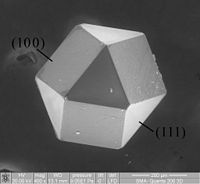
Photo from wikipedia
Abstract Solid polymer electrolytes (SPEs) stand to revolutionize battery technology innovation by making batteries non-flammable, flexible, and more sustainable. However, SPE breakthroughs are limited by the highly time and resource-intensive… Click to show full abstract
Abstract Solid polymer electrolytes (SPEs) stand to revolutionize battery technology innovation by making batteries non-flammable, flexible, and more sustainable. However, SPE breakthroughs are limited by the highly time and resource-intensive nature of battery research. Even when suitable materials are discovered, optimizing the composition and experimental conditions presents another critical barrier to SPE realization. In this work, a data-driven approach to SPE development is presented. First, data is collected and analyzed from published literature, and then supplemented with independent experimentation to complete the SPE dataset. Then, six different models (linear regression, lasso regression, ridge regression, decision tree, random forest, and radial basis function SVM) were tested. The random forest model is identified as the most suitable model with the greatest predictive capability, validated by independent experimentation and by comparing predicted activation energies to those reported in literature using raw predictions from the model. The random forest model is calculated to predict conductivity with a root-mean-square-error of 0.332 log(S/cm). By applying machine learning to incorporate important parameters of SPE synthesis, this study provides a foundation for accelerated SPE innovation.
Journal Title: Computational Materials Science
Year Published: 2021
Link to full text (if available)
Share on Social Media: Sign Up to like & get
recommendations!